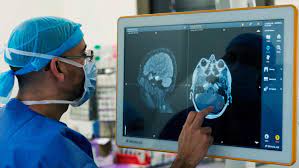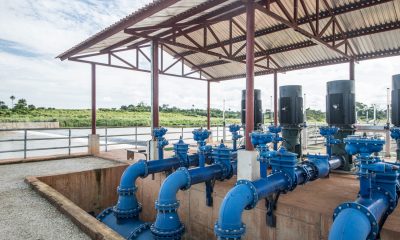Health
Radiologists Seek Govt, Private Sector Investments in ‘Interventional Radiology’

A professor of Radiology, Abiodun Adeyinka, has urged the Federal Government and private sector to invest in ‘Interventional Radiology’ to boost modern medicine practices in Nigeria.
Adeyinka, a consultant radiologist, College of Medicine, UCH, Ibadan, made the at the 2022 faculty day celebration by the Faculty of Radiology, National Postgraduate Medical College of Nigeria, on Monday, in Lagos.
Newsmen report that the theme of the programme is: “Role of Interventional Radiology In Modern Medicine In Nigeria”.
He described interventional radiology as a sub-specialty in radiology that performs various minimally-invasive procedures that diagnose, treat and cure many kind of conditions using medical imaging guidance such as X-rays, Magnetic Resonance Imaging (MRI) or ultrasound.
Adeyinka,the key speaker at event, said that interventional radiology had not replaced surgery but provided a less invasive way of doing some surgical procedures that would had kept patient in the hospital for about three to four weeks.
According to him, with the interventional radiology the surgical procedure is done on a daily basis and achieves the same result as surgery and the patient leaves the hospital within some hours.
He said that interventional radiology remained the best medical offer a patient could get because “it is an advancement in the medical practice.”
“Instead of an open surgical operation, the interventional radiology can be used to give a permanent cure to fibroids, cancer and cardiac conditions.
“It can be used to stop the supply of blood to fibroid tumor in women and once the tumor no longer gets blood, it shrinks and dies.
“But where we are having problems is in the area of equipment; the materials and equipment used in interventional radiology are quite expensive.
“That’s why we need government as well as private sector to come in and provide or subsidise the cost of some of the equipment,” he said.
Adeyinka, therefore, urged government to make it easier for the equipment to be imported into the country by reducing or totally removing the excessive tariffs placed on them at the ports.
“There are some of our partners abroad that want to donate some of the equipment to Nigeria but due to high tariffs, they are stocked there at the port.
“There are just about 19 centres in Nigeria that have interventional radiology. Even if government can’t provide the equipment, at least it can create the enabling environment for the equipment to easily enter the country,” Adeyinka said.
The Faculty Chairperson, Prof. Rachel Akinola, identified consumables and manpower as major challenges that limit the adoption and practice of interventional radiology in Nigeria.
Akinola, also a consultant radiologist, Lagos State University Teaching Hospital (LASUTH), said there were limited number of trained professionals to handle interventional radiology in Nigeria.
In her speech of welcome, Akinola, also lamented that the few available trained professionals were leaving the country to practice abroad.
She, therefore, called on the government to intensify efforts not only to train professionals on interventional radiology, but to retain the already trained doctors and medical professionals.
Another consultant radiologist, Dr Caleb Yakubu, said the essence of the programme was to sensitise and educate the general populace on the relevance of radiology in medical operations.
Yakubu, also the Coordinator, One-Stop-Breast Clinic, Lagos University Teaching Hospital (LUTH), said the objective was to educate the public on ways to benefit from the modern medical advancements that were evolving.
He emphasised the need for women to go for cancer screening with the aid of mammography machines.
Yakubu added that government ensure provision of the machines in states and federal hospitals across the country.
“The key to effective management of cancer is early detection. And eight out of every 10 Nigerian women has breast cancer. And the type of breast cancer they have is very aggressive and they are presented late.
“So, let government provide mammography machines in all government hospitals and make them readily available, accessible and affordable so that Nigeria women can easily be screened for cancer,” he said.
A retired consultant radiologist, Prof. Gbadebo Olusegun, urged the Federal Government to do everything possible to stop the increasing brain drain and medical tourism among the Nigerian citizens.
According to him, setting up functional and equipped interventional radiology centres with trained professionals will help to curb medical tourism and brain drain in the country.
“Unfortunately, hard times are here, where we are confronted with massive brain drain of medical professionals and unimaginable foreign exchange bastardisation.
“If people can get in Nigeria the same quality of healthcare they seek abroad, they will have no reason to travel to another country.
“This will also conserve foreign exchange and save capital flight,” Olusegun said. (NAN)
Health
WHO Approves 2 New Vaccines to Protect Infants From RSV

The World Health Organization (WHO), on Friday, issued recommendations for two new immunisation tools to protect infants from Respiratory Syncytial Virus (RSV)They included a maternal vaccine, administered to pregnant women in their third trimester to protect their newborns.The other was a long-acting antibody injection for infants, which begins to protect within a week of administration and lasts for at least five months.
According to WHO, RSV is the leading cause of acute lower respiratory infections in children globally. It causes around 100,000 deaths and 3.6 million hospitalisations each year among children under the age of five, while infants under six months are most at risk.Alarmingly, 97 per cent of these deaths occur in low and middle-income countries, according to WHO.Although RSV can infect people of all ages, “it is especially harmful to infants, particularly those born prematurely,” a WHO official, Kate O’Brien, said.O’Brien added that around half of all RSV-related deaths occurred in babies younger than six months.Considering the global burden of severe RSV illness in infants, WHO recommended that all countries adopt either the maternal vaccine or the antibody injection as part of their national immunisation strategies.“These RSV immunisation products can transform the fight against severe RSV disease, dramatically reduce hospitalisations and deaths, and ultimately save many infant lives worldwide,” O’Brien said. (NAN)Health
UNICEF Promotes Menstrual Hygiene for Girls

The United Nations Children’s Fund (UNICEF) has encouraged girls to embrace menstruation with pride and confidence, recognizing themselves as vital contributors to humanity’s sustainability.
Mrs Aderonke Akinwole, Social and Behavioural Change Specialist at UNICEF, gave the advice during an event on Wednesday organised with the Nigeria Girls’ Guild and Lagos State Primary Health Care Board.
The event was held to commemorate Menstrual Hygiene Day (MHDay) and was attended by students from both public and private schools across Lagos.
With the theme ‘Together for a Period Friendly World,’ the event aimed to raise awareness and promote dignity in menstrual hygiene.
“When a girl begins menstruation, it should be celebrated. It signifies her transition into womanhood and her ability to sustain life.
“They should be proud, and seek accurate, helpful information to remain safe, clean, and healthy during their period,” Akinwole said.
She emphasised that girls must not feel ashamed, as menstruation is a natural part of womanhood and a symbol of female dignity.
She urged the state government to increase sensitisation efforts and include menstrual hygiene education in school curricula, religious settings, and community platforms.
Akinwole also warned against stigmatisation, especially from boys, and called for boys to be educated to respect menstruation as part of girls’ lives.
“Girls should understand the menstrual cycle even before it starts. This should be part of health education in schools, churches, mosques, and communities,” she said.
She explained that girls need awareness on menstrual hygiene management and should know how to prepare for their periods in a healthy, informed way.
Mrs Honfor Adesola, Director of Education at Lagos State Primary Education Board, commended UNICEF’s support in promoting menstrual hygiene and addressing issues affecting girls.
Adesola highlighted that maintaining menstrual hygiene is vital in preventing infections and ensuring comfort throughout the menstrual cycle.
She noted that the event also helped to raise awareness about the Human Papillomavirus (HPV) vaccine available free in health centres across Lagos.
“We’re here to mark MHDay and to engage girls on HPV awareness. The state government has provided the vaccine, and sensitisation must continue,” she explained.
She encouraged girls to discuss the HPV vaccine with their parents to gain consent, ensuring protection against cervical cancer.
“The vaccine is safe, effective, and accessible in state facilities for girls aged nine to fourteen, but many have not yet been vaccinated,” she added.
Meanwhile, Ethagah Divine, Head Girl of New Estate Baptist Secondary School, Surulere, called on NGOs to provide sanitary pads for girls.
She urged more campaigns and rallies to distribute free menstrual products, like UNICEF did, to promote hygiene and dignity during menstruation.
Miss Emmanuella Azubuike, a student of the same school, expressed gratitude to UNICEF and partners for the impactful menstrual hygiene awareness event.
“This programme has expanded my knowledge on menstrual hygiene and HPV. More NGOs should support these campaigns to reach and educate more young girls,” she said. (NAN)
Health
Soludo’s Wife Establishes Pad Banks in 300 schools

Wife of Anambra State Governor, Dr Nonye Soludo, says she has established pad banks in 300 schools across the state as part of her pet project, Healthy Living Initiative.
Mrs Soludo disclosed this in a message in Awka on Wednesday to mark the 2025 World Menstrual Hygiene Day.
She said that the initiative was her own approach to helping school girls whose academic focus could be affected during menstruation and related emergencies.
Mrs Soludo stressed the need to provide immediate solutions for menstrual emergencies in schools, so that girls caught off guard could confidently rely on the pad banks.
“Official data say that an estimated 37 million women and girls in Nigeria are unable to afford sanitary pads and only rely on unhygienic alternatives.
“The data reinforce World Health Organisation and United Nations Children’s Fund finding that poor water, sanitation and hygiene infrastructure hinders safe and dignified menstruation for women and girls.
“Other data say that only two in five schools globally offer menstrual health education and just one in three have bins for menstrual waste.
“These figures challenge key stakeholders to find practical solutions to address the root of the problem while the situation remains reversible.”
She called for intensified campaign to reach more women and girls currently facing menstrual hygiene challenges.
The governor’s wife noted that the growing number of women, especially girls, in urgent need of menstrual support makes it essential for stakeholders to re-strategise their campaign approach.
According to her, menstrual health remains the right of every girl-child.
She encouraged girls at the designated schools participating in the pad bank project to use the supplies with confidence.
Mrs Soludo assured them that her NGO was fully committed to restocking any of the pad banks that run out of sanitary products.(NAN)




















